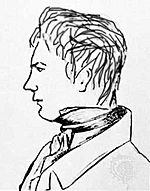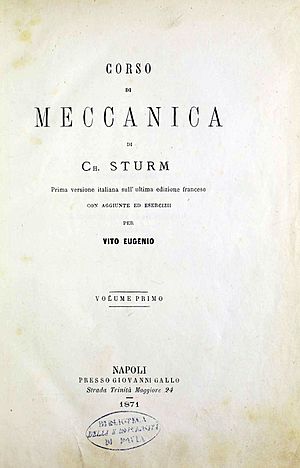Jacques Charles François Sturm facts for kids
Quick facts for kids
Jacques Charles François Sturm
|
|
|---|---|

Jacques Charles François Sturm portrayed by Jean-Daniel Colladon
|
|
| Born | 29 September 1803 |
| Died | 15 December 1855 (aged 52) |
| Nationality | French |
| Known for | Sturm separation theorem Sturm series Sturm's theorem Sturm–Liouville theory Sturm–Picone comparison theorem Speed of sound Sturm's conoid |
| Awards | Légion d'Honneur (1837) Copley Medal (1840) |
| Scientific career | |
| Fields | Mathematics |
| Institutions | École Polytechnique |
Jacques Charles François Sturm (born September 29, 1803 – died December 15, 1855) was a French mathematician. He made important discoveries in mathematics, especially with his famous work, the Sturm's theorem.
Contents
Early Life and Education
Jacques Charles François Sturm was born in Geneva, Switzerland, in 1803. His father's family had moved to Geneva from Strasbourg around 1760. His mother's name was Jeanne-Louise-Henriette Gremay.
In 1818, Sturm began attending lectures at the Academy of Geneva. Sadly, his father passed away the next year. This meant Sturm had to start giving lessons to children from wealthy families to help support his own family. In 1823, he became a tutor for the son of Madame de Staël, a famous writer.
Later in 1823, Sturm visited Paris with his student's family. He decided to stay there with his friend, Jean-Daniel Colladon. They found work at a publication called the Bulletin universel.
Important Discoveries
In 1829, Sturm made a big discovery: the Sturm's theorem. This theorem helps mathematicians figure out how many real roots a polynomial equation has. It also helps them find where these roots are located.
Measuring the Speed of Sound
In 1826, Sturm worked with his friend Jean-Daniel Colladon. Together, they conducted the first experiment to measure the speed of sound in water. This was a very important scientific achievement!
Career and Recognition
The 1830 revolution in France helped Sturm's career. Because he was Protestant, it had been harder for him to get public jobs before. After the revolution, this was no longer a problem. In late 1830, he became a professor of special mathematics at the collège Rollin.
In 1836, Sturm was chosen to be a member of the Académie des Sciences, a very respected scientific group. He took the place of another famous scientist, André-Marie Ampère. By 1838, he became a répétiteur (a type of teaching assistant), and in 1840, he became a full professor at the École Polytechnique.
That same year, after the death of Siméon Denis Poisson, Sturm was appointed as a mechanics professor. He taught at the Faculté des sciences de Paris. His important books, Cours d'analyse de l'école polytechnique (1857–1863) and Cours de mécanique de l'école polytechnique (1861), were published after he died. These books were used for many years.
Sturm also shared credit for the Sturm–Liouville theory with another mathematician, Joseph Liouville.
Later Life and Legacy
In 1851, Sturm's health began to get worse. He tried to keep teaching during his long illness, but he passed away in 1855.
Sturm's work left a lasting mark on mathematics. An asteroid called 31043 Sturm is named after him. His name is also one of the 72 names carved into the Eiffel Tower in Paris, honoring his contributions.
Awards and Honors
Sturm received many important awards and honors during his life:
- Grand prix de Mathématiques (1834)
- Member of the Academy of Berlin (1835)
- Member of the Academy of Saint-Petersburg (1836)
- Officier de la Légion d'Honneur (1837)
- Copley Medal from the Royal Society of London (1840)
- Member of the Royal Society of London (1840)
Selected Writings
- Cours d'analyse de l'Ecole polytechnique. Tome premier (Gauthier-Villars, 1877)
- Cours d'analyse de l'Ecole polytechnique. Tome second (Gauthier-Villars, 1877)
- Cours de mécanique de l'Ecole polytechnique (Gauthier-Villars, 1883)
See Also
- Control theory
- Oscillation theory
- Spectral theory of ordinary differential equations
- Submarine signals
 | Leon Lynch |
 | Milton P. Webster |
 | Ferdinand Smith |


